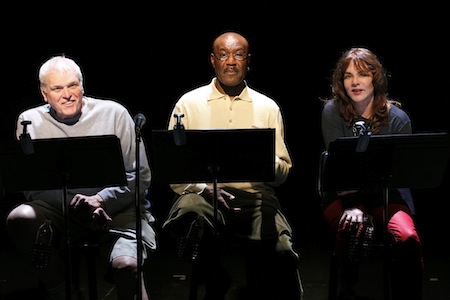"The Exonerated" is a Relentless, Scalding Indictment of the U.S. Justice System

The Exonerated
The Culture Project
45 Bleecker Street
New York, N. Y.
If you walk into the lobby of the Culture Project Theater, home to many "crusade for justice"-style plays, you'll be met with an oversized portrait of a man who did twenty-two years in prison for a crime he didn't commit. He's surrounded by a portrait gallery of other "criminals" who spent years in prison for crimes committed by others and were finally released. It's a gigantic Wall of Shame.
Welcome to The Exonerated.
The Exonerated was written by Jessica Blank and Erik Jensen and is based on the court papers and interviews of all the exonerated inmates in the show. Nothing is made up. The five former inmates on stage are just a handful of the more than three hundred people released from death row in prisons all over America during the last ten years, proven innocent after DNA tests or long-concealed evidence surfaced. Many served more than twenty years.
This is an unconventional but yet forceful play. The actors, representing the accused, their wives and prison guards, sit on a long line of black chairs, elevated a few feet from the floor of the theater, and tell their stories.
The power of the drama is the power of the raw injustices perpetrated on the prisoners. The performers reveal not just wrenching stories, but shocking tales of a criminal justice system run amuck, and one that has been running amuck for decades.
Consider the case of Sunny Jacobs, an actual former inmate who was in the cast on the day I saw the play (different stars, such as Stockard Channing and Brian Dennehy, plus the actual inmates, appear in the play in different weeks). Sunny was given a ride to Palm Beach, Florida, by a friend of her boyfriend. They wound up in the clutches of a man who stole a police car, put them in it and raced out of town. Two police officers were killed in a hail of gunfire from the car. Sunny was charged with murder and convicted. She spent sixteen years in prison. During that time, the real killer admitted that Sunny had nothing to do with the deaths of the officers, but Florida kept her in jail anyway.
Gary Gauger, played by singer Lyle Lovett, did not know where his parents were and called the police. They found his father slashed to death in his store and mother murdered in a trailer in front of her home. Gauger was charged and convicted. He was finally released, years later, when two biker gang members were found guilty of the double homicide.
None of the stories in the play are unusual. Illegal incarceration can happen to anybody.
Bob Balaban does excellent work of directing because he just lets the actors tell their stories, with little, but subtle and effective, orders from him. He receives fine work from his actors. In the show I saw Sunny Jacobs, a demure, short, quiet woman, played herself. Erik Jensen plays Kerry Max Cook, Delroy Lindo was Delbert Tibbs, Lyle Lovett was Gary Gauger. Others in the cast were Jim Brachetta, Amelia Campbell, Bruce Kronenberg, Curtis McClarin, April Thompson and JD Williams.
The cast delivers poignant and heart breaking performances in The Exonerated and their stories are gripping. What's really jolting, though, is the realization that before DNA tests, many innocent people must have been executed.
People see these plays and shout that something should be done. They are wrong. Something must be done.
PRODUCTION: Producers: Culture Project, the Innocence Project, Marc and Steven Kaplan and Cheryl Wiesenfeld; Sets: Tom Ontiveros; Lighting: Tom Ontiveros; Costumes: Mimi O'Donnell. The play is directed by Bob Balaban.
